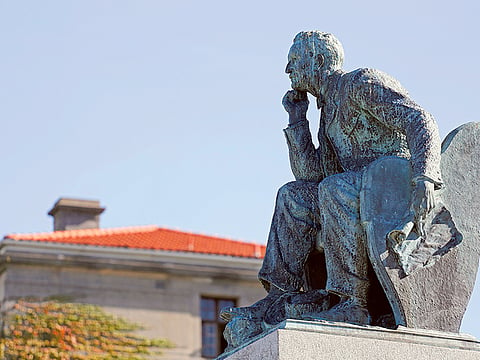Cape Town university votes to remove Cecil Rhodes statue
Request now due to be submitted to historical heritage authorities

Cape Town: South Africa’s oldest university voted on Wednesday to remove a statue of colonial-era businessman Cecil Rhodes from its campus, following a month of student protests against a perceived symbol of historical white oppression.
The vote by the council at the University of Cape Town (UCT), an institution regularly ranked as the best on the continent, was one of the last steps required to remove the statue, with a request now due to be submitted to historical heritage authorities.
“UCT Council has voted in favour of removing the Cecil John Rhodes statue from UCT’s upper campus,” the institution said in a statement.
Although a review of campus memorials was already underway, the university said, “the depth and breadth of feelings on the issue unleashed by the student protest challenged us to accelerate the consideration of the Rhodes statue.”
The British politician’s bronze likeness could be removed as early as Thursday, it added, before being handed over to heritage officials.
The statue of the notoriously racist Rhodes has been boarded up since it was hit with a bucket of human excrement and wrapped in black garbage bags in March. It was targeted for making students feel alienated on a campus still dominated by white staff, they said.
Many of the students involved in the protests never lived under the injustices of white minority rule, but say they still experience racial discrimination 21 years after the end of apartheid.
The university was built on land donated by Rhodes, a mining tycoon who died in 1902, and occupies territory that students say he stole from black Africans.
On March 27, the university senate voted 181 to one to remove the statue permanently from the campus, after vice-chancellor Max Price acknowledged “the many injustices of colonial conquest enacted under Rhodes’ watch”.
Rhodes dreamt of a British empire that would stretch from Cairo to Cape Town, and lent his name to the territories of Rhodesia from the 1890s onwards, representing present-day Zambia and Zimbabwe.
He is also known for founding global diamond house De Beers.
The #Rhodesmustfall movement begun by students at UCT is indicative of a wider discussion in South African society of the status of colonial-era monuments.
Since their protests began, students at the University of KwaZulu Natal in the east coast city of Durban have splattered white paint and anti-racism slogans on a statue of Britain’s King George V.
And at Rhodes University in the Eastern Cape, activists are calling for the institution to be renamed.


![The incident occurred in the early hours of Tuesday in Kampani Zurak community, located in the Wase area of Plateau state. [Illustrative image]](http://media.assettype.com/gulfnews%2Fimport%2F2022%2F12%2F13%2FSTOCK-ambulance_1850a298a2c_large.jpg?w=320&auto=format%2Ccompress&fit=max)
